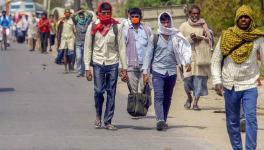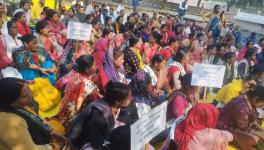In Multiple Countries, Alarm Over Hunger Crisis Rings Louder
Abs (Yemen): The twin baby boys lay on a bed of woven palm leaves in a remote camp for displaced people in Yemen's north, their collar bones and ribs visible. They cried loudly, twisting as if in pain, not from disease but from the hunger gnawing away at them.
Here, UN officials' increasingly dire warnings that a hunger crisis is growing around the world are becoming reality.
UN agencies have warned that some 250 million people in 20 countries are threatened with sharply spiking malnutrition or even famine in coming months.
The United Nations humanitarian office this week released $100 million in emergency funding to seven countries most at risk of famine — Yemen, Afghanistan, South Sudan, Ethiopia, Nigeria, Congo, and Burkina Faso.
But David Beasley, head of the World Food Program, says billions in new aid are needed. Without it, “we are going to have famines of biblical proportions in 2021,” he said in an Associated Press interview last week.
In multiple countries, the coronavirus pandemic has added a new burden on top of the impact of ongoing wars, pushing more people into poverty, unable to afford food. At the same time, international aid funding has fallen short, weakening a safety net that keeps people alive.
In Afghanistan's capital Kabul, Zemaray Hakimi said he can only give his children one meal a day, usually hard, black bread dunked in tea. He lost his work as a taxi driver after contracting COVID-19 and now waits daily on the street for day labourer work that rarely comes.
When his children complain of hunger, he said, “I tell them to bear it. One day maybe we can get something better.” South Sudan may be closer than any other country to famine, as crisis after crisis wears on a population depleted by five years of civil war.
The UN projected earlier this year that a quarter of the population of Jonglei State, home to more than 1.2 million, would reach the brink of famine.
Now cut off from much of the world by flooding that has affected some one million people, many South Sudanese have seen farming and other food routines ripped apart.
The challenges are so numerous that “plastic sheets are not available, as they had largely been used for the previous flood response,” the U.N. humanitarian agency said this week.
COVID-19 has restricted trade and travel. Food prices rose. Post-war unrest remains deadly; gunmen recently fired on WFP boats carrying supplies.
“The convergence of conflict, macroeconomic crisis, recurrent flooding as well as the indirect impacts of COVID create a 'perfect storm,'” the country director for the CARE aid group, Rosalind Crowther, said in an email. “Flooding and violence have led to massive displacement, low crop production and loss of livelihoods and livestock.” In the Arabian peninsula, Yemen is on a “countdown to catastrophe,” Beasley, of the WFP, warned the Security Council last week.
“Famine is truly a real and dangerous possibility and the warning lights are ... flashing red — as red can be,” he said.
For years, Yemen has been the centre of the world's worst food crisis, driven by the destructive civil war between Iranian-backed Houthi rebels who took over the north and the capital, Sanaa, in 2014 and a Saudi-led coalition backing the government in the south.
International aid pulled it from the edge of famine two years ago. But the threat has surged back this year, fuelled by increasing violence and a currency collapse that put food out of reach for growing numbers of people.
Donors have been wary of new funding because of corruption and restrictions that Houthis have put on humanitarian workers. The U.N. had to cut in half the rations it gives to 9 million people — and faces possible cuts to another 6 million in January.
The 18-month-old twins, Mohammed and Ali, weigh only about 3 kilograms, or 6.6 pounds, less than a third of the weight they should be, according to their doctor.
Their father, Hassan al-Jamai, was a farmer in northern Hajjah province near the border with Saudi Arabia. Soon after their birth, the family had to flee fighting to a displaced camp in the district of Abs.
“We are struggling to treat them,” said Mariam Hassam, the twins' grandmother. “Their father took them everywhere.” Two-thirds of Yemen's population of about 28 million people are hungry. In the south, U.N. data from recent surveys show cases of severe acute malnutrition rose 15.5 per cent this year, and at least 98,000 children under five could die of it.
By the end of the year, 41% of the south's eight million people are expected to have significant gaps in food consumption, up from 25%.
The situation could be worse in Sanaa and the north, home to more than 20 million people. The U.N. is currently conducting a similar survey there.
Sanaa's main hospital, al-Sabeen, received over 180 cases of malnutrition and acute malnutrition the past three months, well over its capacities, according Amin al-Eizari, a nurse.
In Afghanistan — like Yemen, crippled by war — the pandemic has meant further losses of jobs and mounting food prices. The poverty rate is expected to leap this year from 54% of the population of some 36 million to as high as 72%, according to World Bank projections.
Some 700,000 Afghan workers returned from Iran and Pakistan this year, fleeing coronavirus outbreaks. That halted millions of dollars in remittances, a key income for families in Afghanistan, and returnees flooded the ranks of those needing work.
Get the latest reports & analysis with people's perspective on Protests, movements & deep analytical videos, discussions of the current affairs in your Telegram app. Subscribe to NewsClick's Telegram channel & get Real-Time updates on stories, as they get published on our website.
























